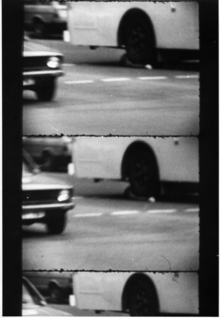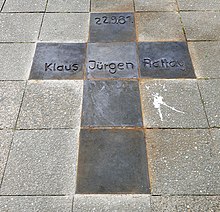Death of Klaus-Jürgen Rattay

Klaus-Jürgen Rattay (c.1963-1981) was an 18-year-old punk from Kleve, Germany, who was run over and killed by a bus in Berlin. He was participating in a 1981 demonstration against the eviction of eight buildings in Schöneberg on the order of senator Heinrich Lummer. His death caused debate in the Berlin Senate and a change in policy towards squatters; his life is commemorated by autonomous groups.
Death[edit]
In 1981, the West Berlin squatters movement was at the height of its influence, with 165 squatted buildings in the city. Senator Heinrich Lummer of the CDU wanted to take a hardline approach and on 22 September 1981, squatters were evicted from eight buildings in Schöneberg on his order.[1][2][3] Lummer invited journalists to a press conference in one of the empty buildings, Bülowstraße 89, which led to protestors gathering in the street outside. The police charged demonstrators on Potsdamer Straße near to Potsdamer Platz and pushed them into the road.[4][2][5] In consequence Klaus-Jürgen Rattay, an 18-year-old punk from Kleve, was run over by a BVG bus. He was dragged for 30 metres and died of his injuries immediately at the scene.[4][2]
Legacy[edit]

Rattay's death had a political impact in the city of Berlin. Supporters of the squatters movement urged the Senate to legalise squats instead of evicting them and pressed for an eviction moratorium which lasted until Easter 1982. Governing Mayor of Berlin Richard von Weizsäcker (CDU) took a more conciliatory approach than Lummer and by 1984, 105 of the 165 squatted buildings had been legalized, with the rest evicted.[3][6]
Various autonomous groups have commemorated Rattay by using his name when taking direct action. In 2016, the Klaus Jürgen Rattay Commandos attacked 28 cars around Potsdamer Platz and 20 cars the next night in Neukölln.[7]
See also[edit]
References[edit]
- ^ Nowakowski, Gerd (7 July 2016). "Eskalation bei Hausbesetzungen in Berlin: Wie Gewalt in der Mainzer Straße die Koalition zerbrechen ließ". Der Tagesspiegel Online (in German). Retrieved 27 September 2023.
- ^ a b c von Törne, Lars (10 February 2016). "Klaus-Jürgen Rattay und aktuelle Krawalle in Berlin: Die Rückkehr einer Hausbesetzer-Ikone". Der Tagesspiegel Online (in German). Archived from the original on 27 September 2023. Retrieved 27 September 2023.
- ^ a b Holm, Andrej; Kuhn, Armin (May 2011). "Squatting and Urban Renewal: The Interaction of Squatter Movements and Strategies of Urban Restructuring in Berlin: Squatting and urban renewal in Berlin". International Journal of Urban and Regional Research. 35 (3): 644–658. doi:10.1111/j.1468-2427.2010.001009.x. PMID 21898937.
- ^ a b Kneist, Sigrid (21 September 2021). "Tod eines Hausbesetzers: Berlin erinnert an den Punk Klaus-Jürgen Rattay". Der Tagesspiegel Online (in German). Archived from the original on 27 September 2023. Retrieved 27 September 2023.
- ^ "Als der Traum vom anderen Leben zerplatzte". Der Tagesspiegel. 22 September 2001. Archived from the original on 27 September 2023. Retrieved 29 September 2023.
- ^ Meyn, Charlotte Sophie (11 July 2016). "Krawalle: Wie Berlin zur Hochburg der Hausbesetzer wurde". Frankfurter Allgemeine Zeitung (in German). Archived from the original on 27 September 2023. Retrieved 27 September 2023.
- ^ Herzog, Katie (10 February 2016). "Pissed-off anti-gentrification activists smash and burn rich people's cars". Grist. Archived from the original on 12 August 2023. Retrieved 27 September 2023.
